|
|
|
Sort Order |
|
|
|
Items / Page
|
|
|
|
|
|
|
| Srl | Item |
| 1 |
ID:
100963
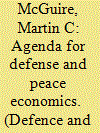

|
|
|
|
|
| Publication |
2010.
|
| Summary/Abstract |
This brief introduction celebrates the 20th Anniversary of the Journal, Defence and Peace Economics. Suggesting elements of an agenda for the future of this branch of economics, I raise several topics that are new and that seem to indicate that the field will expand and shift focus substantially in future years.
|
|
|
|
|
|
|
|
|
|
|
|
|
|
|
|
| 2 |
ID:
100961
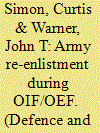

|
|
|
|
|
| Publication |
2010.
|
| Summary/Abstract |
In 2004, stretched by wartime deployments, the US Army countered declining retention by increasing re-enlistment bonuses and implementing stop-loss to prevent soldiers from separating at the end of their enlistment. We estimate the effects of bonuses, deployment, and stop-loss on re-enlistment between FY 2002 and 2006. We estimate that the baseline propensity to re-enlist fell by 20%. However, we find that deployed soldiers are more likely to re-enlist and that the estimated effects of re-enlistment bonuses are similar to those estimated in peacetime. We evaluate the reasons for our findings, and calculate the cost effectiveness of re-enlistment bonuses.
|
|
|
|
|
|
|
|
|
|
|
|
|
|
|
|
| 3 |
ID:
100954
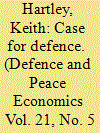

|
|
|
|
|
| Publication |
2010.
|
| Summary/Abstract |
What is the case for defence and is it a worthwhile investment? This question is addressed for two contrasting nations, namely, the UK and New Zealand. Economists have a set of standard analytical tools for addressing the question but they are difficult to operationalise. This paper provides policy-relevant answers.
|
|
|
|
|
|
|
|
|
|
|
|
|
|
|
|
| 4 |
ID:
100958
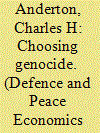

|
|
|
|
|
| Publication |
2010.
|
| Summary/Abstract |
An economic theory of genocide is presented with application to Rwanda-1994. The theory considers 'macro' conditions under which an authority group chooses genocide and 'micro' conditions that facilitate the spread of genocide. From the macro perspective, a bargaining model highlights four rational explanations for an authority's choice of genocide: prevention of loss of power, indivisibility, elimination of a persistent rival, and political bias. From the micro perspective, an evolutionary game model shows how supporters of genocide gain the upper hand in group dynamics over resisters and bystanders. The theory and application suggest that the conditions for genocide are not exceptional.
|
|
|
|
|
|
|
|
|
|
|
|
|
|
|
|
| 5 |
ID:
100968
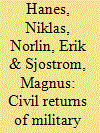

|
|
|
|
|
| Publication |
2010.
|
| Summary/Abstract |
The purpose of our study was to examine the effect of military training on the earnings of young men in Sweden. The analysis is based on the cohort of males born in 1973. This cohort was conscripted during a time of rapid change in Swedish security policy and substantial cutbacks in the armed forces. As a consequence, a relatively large proportion of the cohort was assigned a service category after the enlistment test but one third of these individuals were never conscripted. We argue that these organizational changes, along with data on important background variables, make it possible to rely on selection on observables. A clear finding is that military training has a positive effect on annual earnings at the age of 30 for those men in the category 'private soldier' who do not subsequently obtain a high level of educational.
|
|
|
|
|
|
|
|
|
|
|
|
|
|
|
|
| 6 |
ID:
100953
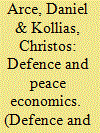

|
|
|
| 7 |
ID:
100965
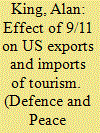

|
|
|
|
|
| Publication |
2010.
|
| Summary/Abstract |
Several studies have investigated whether the terrorist attacks of September 11, 2001, have had an ongoing or merely transitory effect on US trade in tourism. All conclude in favor of the latter. However, limitations in either the data and/or methodology employed by these studies give cause to query their findings. The present study avoids these limitations and finds strong evidence that, once other factors are held constant, real US exports and imports of tourism have both remained significantly below their pre-2001 level.
|
|
|
|
|
|
|
|
|
|
|
|
|
|
|
|
| 8 |
ID:
100960
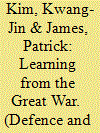

|
|
|
|
|
| Publication |
2010.
|
| Summary/Abstract |
This paper explores the effects of dyadic democracy on both the occurrence and level of militarized disputes, with an emphasis on longitudinal tendencies and degrees of violence. We argue that experience with total war, namely, the First World War, induced democratic constraints on conflictual foreign policies via significant change in military manpower systems. Experience with total war led democratic governments to recognize each other's sensitivity to public concerns about the burdens imposed by conscription. Thus, democratic peace in the modern era can be traced to (1) total war experience for 'old' democracies; and (2) the level of violence in foreign policies exceeding a threshold that induces public concerns about the burden of conscription. Empirical testing based on the Militarized Interstate Disputes (MID) data set shows a significantly different effect for democratic dyads on the onset of militarized disputes before and after the First World War. Democratic dyads, however, do not reduce the likelihood of disputes in cases with a low level of violence regardless of the era in question. This implies that conflict-averse behavior between democracies is a product of learning from the experience of total war that leads to greater government awareness of public concern about more intense foreign policy actions.
|
|
|
|
|
|
|
|
|
|
|
|
|
|
|
|
| 9 |
ID:
100955
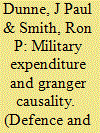

|
|
|
|
|
| Publication |
2010.
|
| Summary/Abstract |
A large literature has used tests for Granger (1969) non-causality, GNC, to examine the interaction of military spending with the economy. Such tests answer a specific although quite limited question: can one reject the null hypothesis that one variable does not help predict another? If one can reject, there is said to be Granger causality, GC. Although the limitations of GNC tests are well known, they are often not emphasised in the applied literature and so may be forgotten. This paper considers the econometric and methodological issues involved and illustrates them with data for the US and other countries. There are three main issues. First, the tests may not be informative about the substantive issue, the interaction of military expenditure and the economy, since Granger causality does not correspond to the usual notion of economic causality. To determine the relationship of the two notions of causality requires an identified structural model. Second, the tests are very sensitive to specification. GNC testing is usually done in the context of a vector autoregression, VAR, and the test results are sensitive to the variables and deterministic terms included in the VAR, lag length, sample or observation window used, treatment of integration and cointegration and level of significance. Statistical criteria may not be very informative about these choices. Third, since the parameters are not structural, the test results may not be stable over different time periods or different countries.
|
|
|
|
|
|
|
|
|
|
|
|
|
|
|
|
| 10 |
ID:
100970
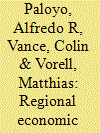

|
|
|
|
|
| Publication |
2010.
|
| Summary/Abstract |
We identify the causal effect of a reduction in military personnel on a number of socioeconomic indicators within the peripheries of military bases. The base realignments and closures in Germany are used as an exogenous source of variation that allows us to identify the effect of a demand shock on household income, output, unemployment, and tax revenue within a specified buffer zone around each base. The analysis covers 298 communities for the period 2003-2007. Consistent with evidence found elsewhere, we find that these base adjustments have only a marginal impact on the local community in which the bases are located.
|
|
|
|
|
|
|
|
|
|
|
|
|
|
|
|
| 11 |
ID:
100956
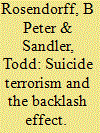

|
|
|
|
|
| Publication |
2010.
|
| Summary/Abstract |
This paper presents a game-theoretic model of suicide terrorism containing three agents: the terrorist leader; a targeted government; and potential terrorist supporters. Supporters join the terrorist group if they gain more from their participation than from their economic opportunities. Preemptive measures by the government can result in a backlash that encourages recruitment through new grievances. Suicide attacks can also lead to recruitment. Increases in preemption costs and/or economic opportunities can reduce the overall level of terrorism, while increasing the proportion of suicide to normal attacks. An increase in the effect of preemption on recruitment, or the propaganda effect of suicide bombings has the opposite effect of increasing normal and suicide attacks, but decreasing the proportion of suicide to normal attacks in the terrorist organization's strategy profile.
|
|
|
|
|
|
|
|
|
|
|
|
|
|
|
|
|
|
|
|
|